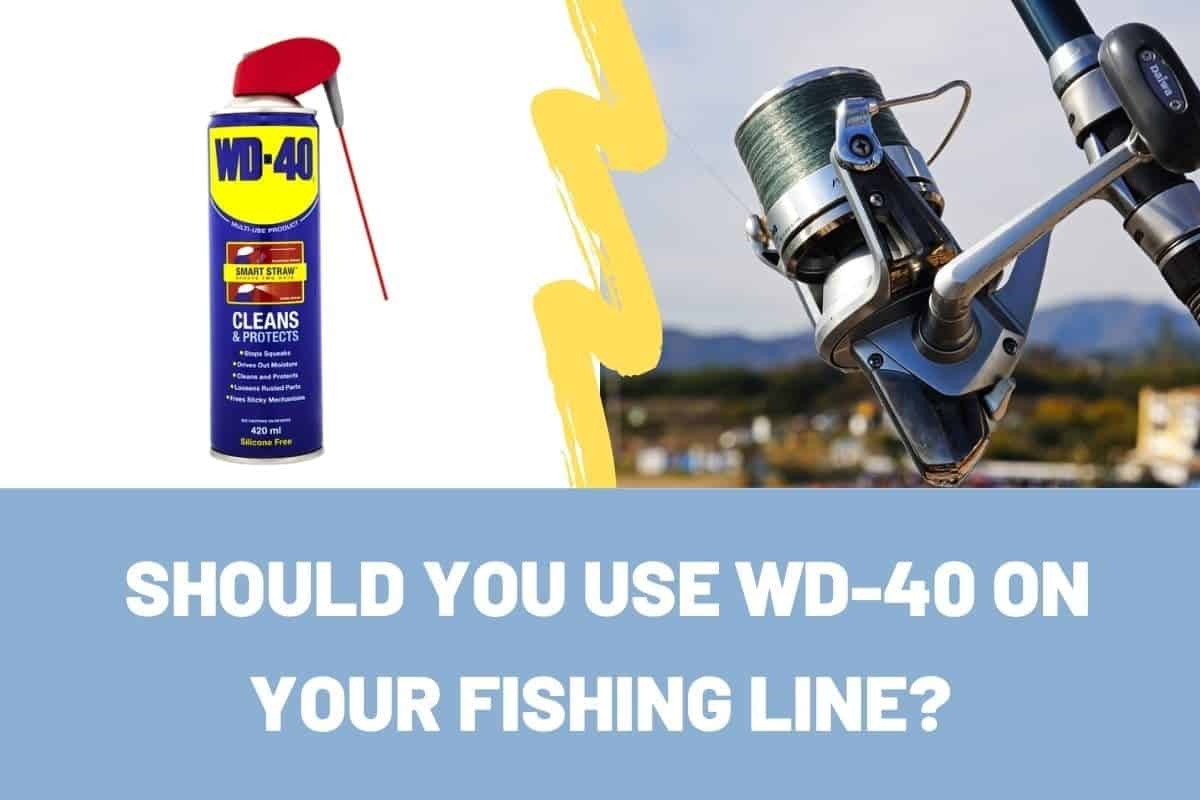
Fishing can be a strange activity, with many anglers trying weird and sometimes not-so-wonderful ways to improve their fishing. Whether this is to improve the way the equipment works or improve their fishing success, every angler wants to try something new to give them an edge. WD-40 is a popular, controversial product used by anglers. Why do anglers use this product, and should you be using it?
Anglers apply WD-40 to their line as a conditioner and a fish attractant. The product has no merit in either of these applications and can be harmful to the angler and the environment. This practice is not recommended. Other products are available that are safer for the angler and the environment.
WD-40 is a product intended to displace water in certain applications where this is necessary to prevent corrosion of parts in certain machinery and mechanisms. It has a limited lubrication effect and is intended for mechanical applications. So why do anglers use this product in their fishing strategy?
How To Lubricate Your Fishing Line With WD-40?
Some anglers spray WD-40 onto their fishing line to act as a lubricant to make the line spool off and onto the reel more smoothly. The product reduces the friction between the strands of line on the reel, minimizing the drag caused when casting or reeling the line back in.
WD-40 is not a lubricant and is not intended to be used as a lubricant. It does have lubricating properties, but they are short-lived.
WD-40 is intended to be used and a degreaser and a water displacement agent. The intended purpose is to spray WD-40 onto a mechanism that is gummed up with old grease and lubricants that have hardened and become stale.
The WD-40 will break down the old grease, allowing it to be cleaned off in preparation for new lubrication to be applied to the mechanism.
Other products are manufactured specifically for anglers as line conditioners and lubricants that are much safer to use for the angler, the line itself, and the environment.
Does WD-40 Damage Fishing Line?
Some anglers have reported that spraying WD-40 onto their fishing line has damaged the line, causing it to become weak and susceptible to breaking.
WD-40 is made from chemical compounds that will affect the different types of fishing lines in different ways. Once again, this is why the fishing industry has developed line lubricants that are intended for use on specific line types that will have the desired lubricating effect without causing damage.
Does WD-40 Damage Monofilament Line?
Monofilament line is made from nylon and is a trusted staple line among anglers, both new and seasoned. The nylon used in the construction of the line is resistant to many chemicals and lubricants.
WD-40 is made from petrochemicals that will not have any damaging effects on monofilament line. However, just because the product will not damage the mono line is not an indication that it should be used in favour of products specifically designed for fishing lines.
Does WD-40 Damage Fluorocarbon Line?
Fluorocarbon fishing line is constructed from a polymer called PVDF. It is valued for its lower visibility in the water and is less buoyant than nylon-based lines.
WD-40 negatively affects the fluoropolymer from which this line is made and causes it to harden and become brittle over time. This weakens the line and makes it unreliable. You should not use WD-40 on a fluorocarbon fishing line.
Does WD-40 Damage Braid Line?
Braided fishing line is made from fine strands of monofilament line woven together to form a braid.
Since the braided line is made from nylon, a chemically resistant material, WD-40 will not degrade this line and cause it to become weak.
Is It Legal To Use Wd-40 On Fishing Lines? (USA & Canada)
It is not illegal to use WD-40 on fishing lines, and there is no law specifically outlawing this practice. However, the chemicals used in the manufacturing of WD-40 are considered pollutants, especially in water.
Some anglers have reported receiving fines for using WD-40, particularly in environmentally sensitive waterways. While there is no law against using WD-40, there are laws against contaminating waterways with petroleum-based products and lubricants.
Fines issued to anglers were probably based on the contravention of this law instead of any law stipulating that the use of WD-40 is illegal.
Will WD-40 Act As A Fish Attractant If It’s On My Line?
Some anglers believe that the ingredients used in WD-40 will act as a fish attractant, and they apply it to their line and lures for this purpose.
Some anglers even believe that the lubrication properties of WD-40 are due to fish oil being used in the product.
Let’s examine the validity of these claims, starting with the ingredients used to manufacture WD-40.
What Is WD40 Made From?
While the manufacturers are not obliged to list all the ingredients in their product, they must list any ingredients that pose a chemical hazard.
The three ingredients listed on their datasheet that are included as hazardous ingredients in WD-40 are as follows.
- Aliphatic Hydrocarbon
- Petroleum-based oil
- Carbon dioxide
The company itself denies the inclusion of fish oils in their product and openly states that their use of fish oil in WD-40 is a myth.
There is no evidence that the products used in WD-40 act as a fish attractant. The company actively advises against this practice because the ingredients used are considered pollutants.
Will WD40 Damage The Environment?
There is no direct evidence that WD-40 will damage the environment and many anglers who use the product claim that it is such a small amount that it won’t make any difference.
Even if the amounts introduced into the water are small, they can have a cumulative effect and cause damage in the long term. The manufacturing company even recommends against the use of the product in this way.
How Using WD40 On Your Fishing Line Could Affect Your Health Indirectly
The use of WD-40 in fishing and how many anglers use the product could have some health implications for the angler.
Many anglers liberally soak their line on the reel in WD-40, so the product is dripping off the reel. When fishing, the reel is close to your face, allowing the fumes to be inhaled, and you are constantly touching the line, exposing your skin to the product.
The main ingredient that causes health risks from inhalation and excessive exposure is Aliphatic Hydrocarbon. The manufacturer lists the possible health risks from overexposure to the product as follows.
- Inhalation. High concentrations may cause nasal and respiratory irritation and central nervous system effects such as headache, dizziness, and nausea. Intentional abuse may be harmful or fatal.
- Skin Contact. Prolonged or repeated contact may produce mild irritation and defatting with possible dermatitis.
- Eye Contact. Contact may be irritating to the eyes. It may cause redness and excessive tearing.
- Ingestion. Swallowing the product may cause gastrointestinal irritation, nausea, vomiting, and diarrhea. WD-40 is an aspiration hazard. If the product is swallowed, it can enter the lungs and cause chemical pneumonitis, severe lung damage, and death.
From the potential risks of using this product unnecessarily for fishing, why put yourself at risk? There are safer products designed specifically for these fishing needs that are not harmful to you or the environment.
Should You Be Using WD40 On Your Fishing Line?
The answer to the question about using WD-40 on your line or lures as a conditioner or fish attractant is a resounding no!
There are better and safer products made specifically for the fishing industry to serve in these roles that are better suited to the task, safer for you to use, and less harmful for the environment.
Happy Fishing and Tight Lines
